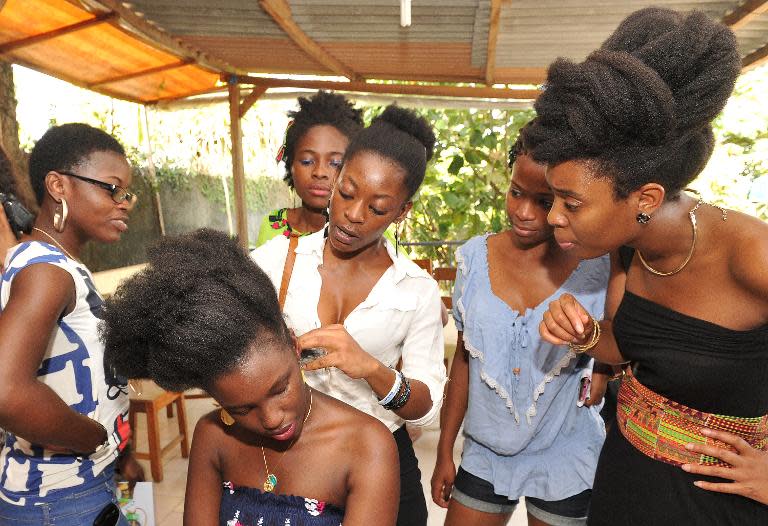Do you remember the Afro, the natural hairstyle that has always been synonymous with the “Black is beautiful” movement of African-Americans in the 1960s? A group in Ivory Coast is trying to convince black women to leave their expensive hair straighteners, extensions and wigs behind and opt for their natural hairstyle instead. The group combines “natural” with “happy” and calls itself “Nappy” – Babi is a nickname for Abidjan, the bustling economic capital of Ivory Coast. Founded over two years ago, the support group now has around 2,400 members and meets every two months in the trendy Cocody district of Abidjan to exchange advice, tips and practical help for natural hair care. Nappys de Babi defies the deeply rooted belief throughout Africa that straight hair best corresponds to an ideal of beauty. In Ivory Coast, most women were teenagers when they began to give up their naturally frizzy, coily hair. As a result, most do not know how to care for their hair and “make it beautiful,” says Miriam Diaby, one of the founders of Nappys de Babi. “Society does not like to see Afro hair lying around everywhere,” she says, lamenting that women have to opt for “conventional” hairstyles that involve straightening them or wearing fake hair in the form of extensions or wigs. The lack of knowledge about hair care is evident in some of the questions asked at the group’s meeting. One participant asked: “How do I know if my hair is moisturized?” “Well, if it’s stiff and dry, that means it’s not moisturized at all,” replies Bibi Gagno, who has created a motivational website, omgiloveyourhair.com. – “Like a pariah” – The African sisters of the American “Black Is Beautiful” advocates of the 1960s must emancipate themselves from the dominant white model, say the Nappys. “When I arrived in Abidjan (after growing up in the US and Europe), I noticed that advertisements everywhere showed fair-skinned women with long, straight hair,” Gagno said. The fair skin – achieved in Ivory Coast mainly through the constant use of carcinogenic bleach – is “synonymous with success,” the businesswoman said. Going against the grain is considered provocative. “People feel uncomfortable with it. When they see you wearing natural hair, they look at you like you’re a pariah, like there’s a problem, when it should be normal,” Liliana Lambert said. Lambert, a 27-year-old half-European who decorates her naturally curly hair with flowers, said people “want to touch hair like that all the time” because they don’t know what it looks like. “It’s just ignorance,” she said. The only nappy boy at the session, Ange-Dady Akre-Loba, a 28-year-old hairdresser with medium-length locks, said men also get strange looks if they don’t stick to the usual short-cropped style of Ivory Coast men. “Five centimeters (two inches) and above is considered too long here… A lot of people would say I have a bit too much hair,” he said. Less conformist men are expected to “stay discreet,” said Akre-Loba, who grew his own hair during the post-election violence that rocked the country in 2010-2011. Back then, it was potentially dangerous to leave the house and most hairdressers were closed anyway, so the uncertainty gave Akre-Loba the excuse to finally go natural, he said. Since then, he has learned to ignore other people’s opinions and “try to carry on regardless and be myself.”

